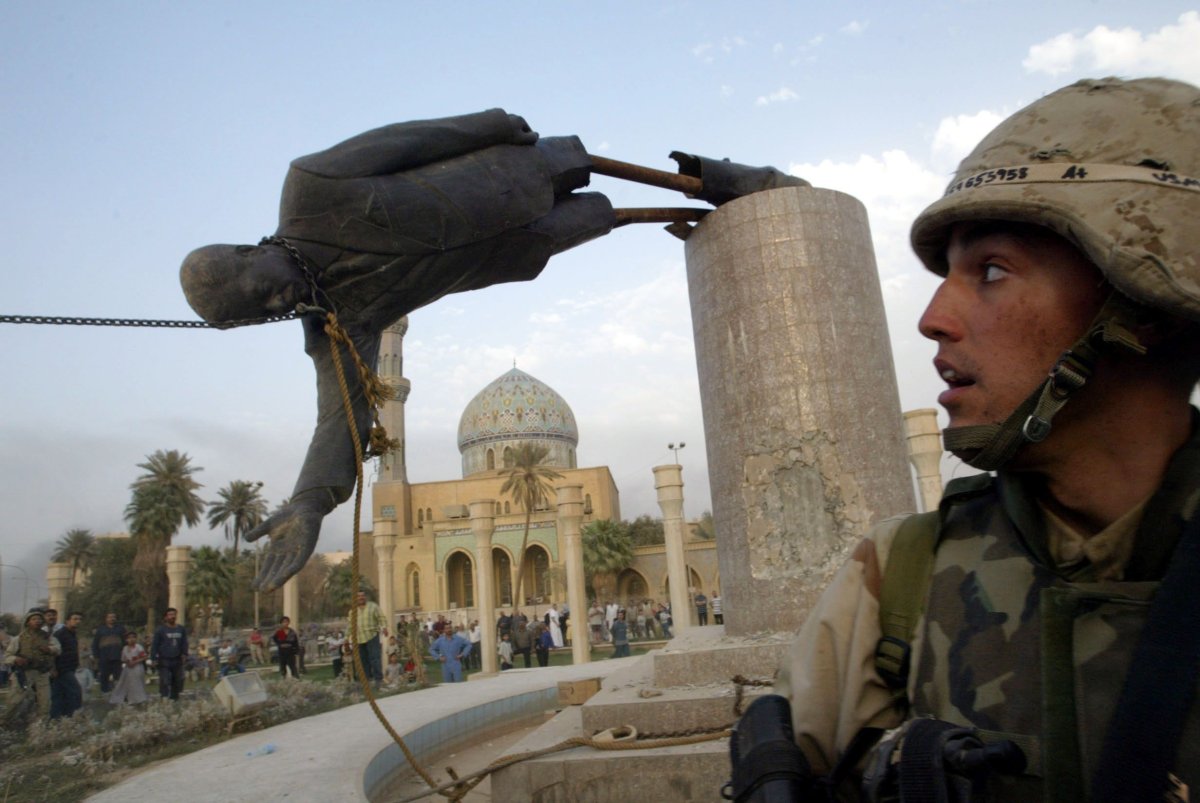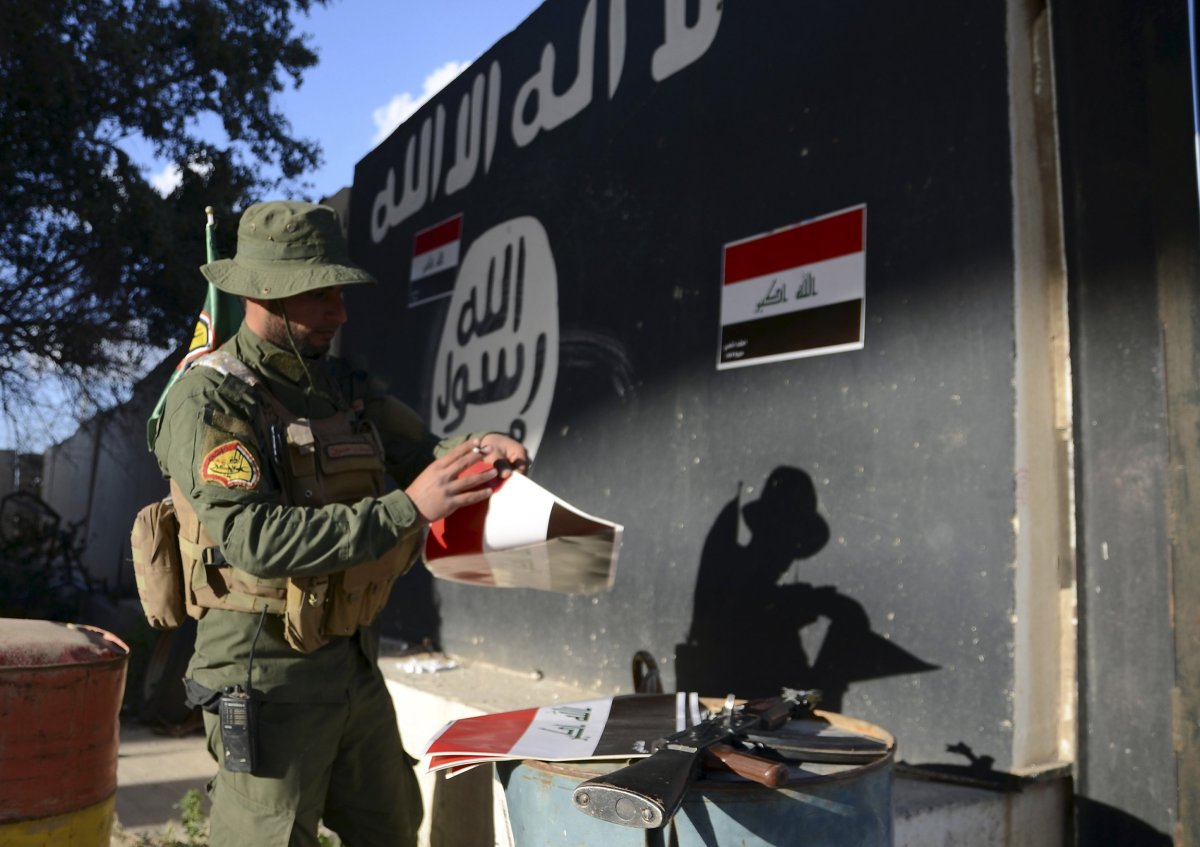The U.S. is still split on whether the 2003 decision to invade Iraq and overthrow its government was the right one, according to a poll conducted 15 years later.
The Pew Research Center published on Monday—one day before the Iraq War's 15th anniversary—a survey showing a major, lingering divide in the U.S. public's opinion of the conflict. Of the 1,466 adults interviewed on March 7-14, results showed that 48 percent believe the U.S. made the "wrong decision" in using military force in Iraq, while 43 percent thought the move was justified.
Related: ISIS Tries to Take Back Iraq As U.S. Allies Switch Sides in Syria
As the U.S. continued to play a major military role in the country, which saw a massive rise in hardline Sunni Muslim insurgency in the aftermath of the U.S. operation, a debate about Washington's prolonged presence has evolved both at home and in Iraq.

After months of attempting to convince other U.N. Security Council members of the imminent danger presented by Iraqi President Saddam Hussein's alleged development of weapons of mass destructions and cooperation with Al-Qaeda, former President George W. Bush and his administration launched on March 20, 2003, an operation termed "Iraqi Freedom." The initial phase of the conflict lasted a little over a month and the U.S. quickly declared victory by the end of April.
The U.S. took control of Baghdad and dismantled Iraq's majority-Sunni Muslim Baathist political system, and instead installed a largely Shiite Muslim administration that largely barred former members of Hussein's government and army. Some of these individuals and many ultraconservative Islamists formed jihadi groups such as Al-Qaeda in Iraq in 2004, which became part of the Islamic State of Iraq in 2006. It was around this period that a war initially backed by up to 71 percent of the U.S. population lost a majority of its supporters, according to the Pew survey.
Support continued to plunge as jihadis waged a vicious insurgency against U.S. and Iraqi troops, as well as Shiite Muslims and minority communities across Iraq. At the same time, some Shiite Muslim groups also came to see the U.S. as an occupying force and, with help from Iran, grew influential and launched attacks on U.S. forces as well. Under former President Barack Obama, the U.S. withdrew most of its personnel, officially ending its combat role in December 2011.
In 2013, Islamic State of Iraq leader Abu Bakr al-Baghdadi—a former prisoner in one the U.S's controversial detainment camps in Iraq—transformed his group into the Islamic State of Iraq and Syria, also known as the Islamic State of Iraq and al-Shaam (the Levant) or ISIS. The group capitalized on an uprising against Syrian President Bashar al-Assad to spread across the border and, at the height of the group's power a year later, ISIS claimed half of Iraq and Syria. A U.S.-led coalition began conducting airstrikes against the group in 2014.
In addition to the U.S. fight against ISIS, Iran has invested substantially in local, mostly Shiite Muslim allies that have helped defeat the group in Iraq and Syria. Russia's backing for the Syrian military has also been credited with wiping out much of the jihadi's terrain in Syria. With multiple, competing international forces on the ground, the battlefield in the Middle East has grown more complex and precarious in the past 15 years.

Iran and Russia's growing roles in the region have come at the expense of the U.S.'s own lengthy involvement. A collective of Iran-backed, mostly Shiite Muslim militias known as the Popular Mobilization Forces were officially inducted into the U.S.-backed Iraqi military earlier this month, putting Washington in a tough position as at least one of these paramilitary groups has been designated a terrorist organization by the State Department.
The Popular Mobilization Forces, which have support from much of Iraq's Shiite Muslim majority, have echoed popular calls for a U.S. withdrawal and have threatened to expedite this departure through the use of force. Russia too has pledged closer security assistance for Iraq, a fellow ally of Assad in Syria, and has entered into talks to sell Baghdad the S-400 Triumf anti-aircraft system—an advanced weapon also sought by U.S. allies Qatar, Saudi Arabia and Turkey.
Local resistance to U.S. presence in post-ISIS Iraq along with the deaths of seven servicemen in a helicopter crash Thursday near the Syrian border has demonstrated the continued risks of the Pentagon's involvement in the war-torn country, long after the leading charges against Hussein turned out to be false. While President Donald Trump recently termed the 2003 invasion of Iraq "the single worst decision ever made" as CNN reported, his administration has also retained the right to keep troops in both Iraq and Syria indefinitely without seeking new authorizations from lawmakers.
Uncommon Knowledge
Newsweek is committed to challenging conventional wisdom and finding connections in the search for common ground.
Newsweek is committed to challenging conventional wisdom and finding connections in the search for common ground.
About the writer
Based in his hometown of Staten Island, New York City, Tom O'Connor is an award-winning Senior Writer of Foreign Policy ... Read more
To read how Newsweek uses AI as a newsroom tool, Click here.








